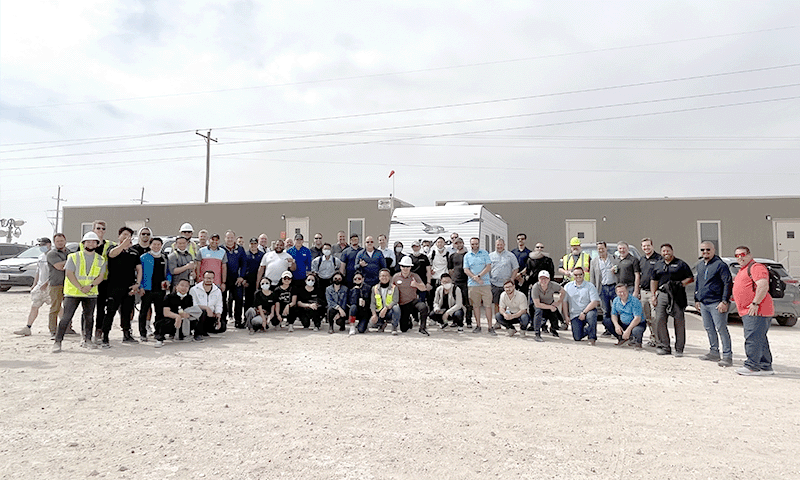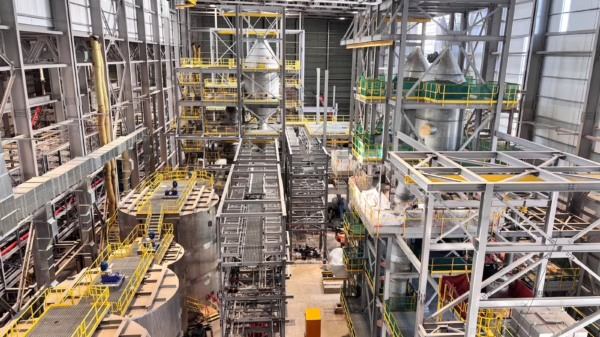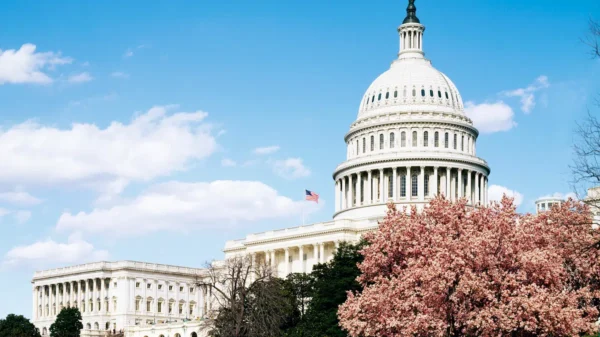The three primary companies behind Bitcoin mining’s back end are getting manufacturing footholds in the United States to avoid the fallout from President Donald Trump’s tariff war.
Announced on Wednesday, this would help the multitude of Bitcoin miners operating in the United States get access to equipment.
Three companies are responsible for approximately 90 per cent of global Bitcoin mining machinery. Bitmain, Canaan Creative (NASDAQ: CAN) and MicroBT build server rigs using application specific integrated circuits (ASIC), which are geared towards only mining Bitcoin.
All three are Chinese companies. Getting a physical foothold in the United States would help shield them from tariffs. It also risks getting the critical eye from the United States over concerns that country has with China over issues like chip making and energy security.
“The U.S.-China trade war is triggering structural, not superficial, changes in bitcoin’s supply chains,” said Guang Yang, chief technology officer at crypto tech provider Conflux Network.
Beyond this, for U.S. firms, “this goes beyond tariffs. It’s a strategic pivot toward ‘politically acceptable’ hardware sources,” Yang said.
Bitmain began producing mining rigs in the U.S. in December, calling it a “strategic move” after Trump’s election win. Canaan also launched trial production in the U.S. to avoid tariffs Trump announced on April 2, said senior executive Leo Wang. He described the initiative as exploratory.
The volatile tariff situation, he added, prevents the company from making a heavier investment.
MicroBT, the third-largest company in the sector, stated it is actively localizing production in the U.S. to reduce tariff exposure.
Read more: Hive Digital levels up Bitcoin mining by passing the 10 exahash per second mark
Read more: Riot Platforms sells off large stake of Bitfarms
China still produces over 90% of mining rigs
The three companies dominate a sector analysts expect to reach $12 billion in value by 2028.
This sector feeds into a broader chain that includes bitcoin mining, IT infrastructure, and trading platforms. Auradine, a U.S. competitor backed by top miner Marathon Digital Holdings (NASDAQ: MARA), has lobbied to limit Chinese hardware imports.
In addition, Auradine’s chief strategy officer Sanjay Gupta noted that while North America handles over 30 per cent of bitcoin mining, China still produces more than 90 per cent of mining rigs—highlighting a major imbalance between regional demand and supply.
Consultancy Frost & Sullivan estimated that, as of December 2023, the top three firms controlled 95.4 per cent of the hardware market by computing power sold.
Gupta warned that connecting hundreds of thousands of Chinese mining rigs to the U.S. electrical grid poses a security risk. In contrast, Wang argued that mining rigs are harmless unless used for bitcoin mining.
He added that manufacturers could still face collateral damage from U.S. restrictions targeting Chinese high-tech firms. Further highlighting the risk, the U.S. government blacklisted Bitmain’s AI affiliate, Sophgo, over security concerns.
China led the entire bitcoin value chain until its 2021 mainland ban on cryptocurrency.
The government cited financial stability risks when it forced miners, traders, and exchanges to relocate abroad.
However, Bitmain, Canaan, and MicroBT maintained dominance in hardware by leveraging their role as technology manufacturers. In addition, they outpaced Western competitors by developing high-performance chips early, gaining a crucial first-mover advantage in mining-specific hardware.
Read more: Synaptogenix pumps $100m into artificial intelligence token
Read more: Strategy continues ongoing strategic investment in Bitcoin
The US imposed a 10% tarriff on many imports
Canaan moved its headquarters from China to Singapore but still maintains operations in China.
It also launched a pilot production line in the U.S., which generated 40 per cent of its revenue last year.
Canaan’s vice president of corporate development and capital markets, Wang, said the goal is to lower costs for both the company and its customers. He added that the threat of tariffs forces the company to explore every available option.
This year, the U.S. imposed a 10 per cent baseline tariff on many imports, plus an additional 20 per cent on goods from China.
It also warned that tariffs may rise for Southeast Asian nations where Chinese rig makers have opened assembly plants. Donald Trump has pledged to become the “crypto president” and push for widespread cryptocurrency adoption in the U.S.
His son, Eric Trump, partnered with energy and tech firm Hut 8 Corp. (TSE: HUT) (NASDAQ: HUT) to launch American Bitcoin, aiming to build a strategic bitcoin reserve. However, pro-crypto policies may also spotlight China’s dominant role in bitcoin infrastructure, placing Chinese rig makers under scrutiny.
U.S. crypto-law attorney John Deaton warned that China’s control of mining hardware creates a choke point for American miners. He added that any Chinese restriction or supply manipulation could disrupt bitcoin’s network and harm U.S. users and investors. The largest miners by market value—MARA, Core Scientific (NASDAQ: CORZ), CleanSpark Inc (NASDAQ: CLSK), and Riot Platforms Inc (NASDAQ: RIOT)—are all based in the U.S.
.














